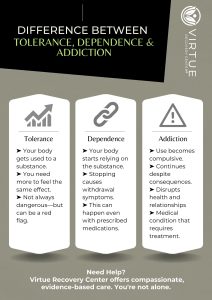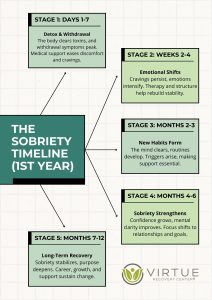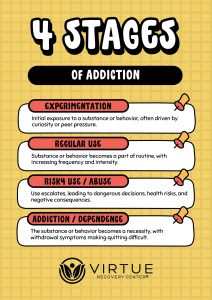Key Takeaways
- Alcohol-induced psychosis is a severe mental health condition that causes symptoms like hallucinations, delusions, and confusion due to heavy drinking or withdrawal.
- This condition can happen during intoxication or withdrawal and carries severe risks for long-term mental and physical health.
- Seeking professional treatment and support is essential for those affected, as it can significantly reduce symptoms and aid recovery.
Introduction to Alcohol Psychosis From Long-Term Alcohol Abuse
Alcohol can be harmful when consumed in excess, and one of the most severe risks is alcohol-induced psychosis. This condition is marked by hallucinations, delusions, and confusion triggered by heavy drinking or abrupt withdrawal from alcohol. These symptoms don’t just affect a person’s mental state but also lead to dangerous situations for them and their loved ones.
Understanding the causes and dangers of alcohol-induced psychosis can help individuals and their families recognize when help is needed. This article explores the symptoms, causes, and treatment options for alcohol-induced psychosis to provide a more straightforward path to managing and overcoming this condition.
Understanding Alcohol-Induced Psychosis From Alcohol Addiction
Alcohol-induced psychosis is a mental disorder linked specifically to excessive alcohol use. Unlike other psychotic disorders, this condition arises directly from alcohol consumption and can occur either during periods of intense drinking or after abruptly stopping alcohol. This psychosis can take different forms, with symptoms that include hallucinations, paranoia, and episodes of confusion.
A common form is alcoholic hallucinosis, where a person may see or hear things that aren’t there, typically during intoxication. Another form, known as delirium tremens (DTs), occurs in some people during alcohol withdrawal. It is the most severe reaction, bringing on intense symptoms like shaking, confusion, and sometimes seizures. For those who drink heavily over long periods, chronic psychosis may develop, sometimes persisting even after stopping alcohol.
Unlike schizophrenia or bipolar disorder, alcohol-induced psychosis is tied explicitly to alcohol use. This makes the diagnosis unique, as the symptoms appear in direct relation to drinking habits rather than as part of a broader mental health condition.
Causes and Risk Factors of Alcoholic Psychosis From Drinking Alcohol
Heavy, prolonged drinking is the leading cause of alcohol-induced psychosis. Over time, alcohol affects the brain by changing its chemistry and damaging cells. This can lead to problems with cognitive function, mood regulation, and memory. When alcohol is suddenly removed from the body after heavy use, it can cause withdrawal symptoms, sometimes leading to psychotic episodes. This is partly because the body and brain have adapted to the presence of alcohol, and adjusting to its absence can be a shock to the system.
Other factors increase the risk of alcohol-induced psychosis, including genetics, mental health history, and environment. People with conditions like anxiety or depression may be more likely to develop psychosis due to alcohol, as these issues can heighten the psychological impact of heavy drinking. Genetics and family history may also make some people more vulnerable. Together, these factors can compound the effects of alcohol, increasing the likelihood of psychotic symptoms with prolonged use.
Symptoms of Alcohol Psychosis
Symptoms of alcohol-induced psychosis can vary, depending on how much alcohol is involved and the length of consumption. However, some common symptoms include:
Hallucinations are often the first noticeable symptom. People may experience vivid and sometimes frightening sights or sounds that aren’t real, such as hearing threatening voices or seeing disturbing visuals. Delusions and paranoia are also common, with people believing they’re in danger or that others are trying to harm them. This can lead to severe confusion, making it difficult to distinguish reality from perception. In addition, individuals often feel disoriented and may exhibit agitation or mood swings. They may struggle with basic decision-making, and their reactions can be unpredictable, making it challenging for loved ones to offer support.
Symptoms like these don’t just affect the person’s mental health but can lead to dangerous behavior. Someone experiencing these symptoms may be at risk of accidents, self-harm, or even aggression toward others, depending on the intensity of their delusions or hallucinations.
The Dangers and Long-Term Risks of Alcohol-Induced Psychosis
Alcohol-induced psychosis is not only distressing but dangerous. During psychotic episodes, people can act in ways that put themselves and others at risk. Delusions and hallucinations may lead them to unsafe actions, like wandering off alone, driving while disoriented, or reacting aggressively. These behaviors are risky and challenging to control without proper support.
In the long term, psychosis resulting from alcohol use can lead to serious health problems. Persistent psychotic episodes can weaken cognitive abilities, impairing memory and daily functioning. Over time, heavy drinking and the psychosis it can trigger also increase the risk of developing additional mental health disorders, like chronic anxiety or depression. Furthermore, the brain damage caused by heavy alcohol use can lead to permanent changes, impacting daily life and relationships.
Relapse is another risk without treatment. People may try to cope with their symptoms by turning back to alcohol, especially if they feel unable to manage the effects on their own. This creates a cycle that can deepen addiction and increase the severity of psychotic episodes.
Treatment Options for Alcohol-Induced Psychosis
Treating alcohol-induced psychosis involves a combination of medical, psychological, and long-term support. A safe medical detox is often the first step in helping individuals withdraw from alcohol under medical supervision to prevent severe symptoms. During detox, medical providers may use medication to ease the transition and reduce hallucinations or delusions.
Therapy is another crucial part of treatment, offering individuals the chance to address the underlying reasons for their alcohol use. Techniques like Cognitive Behavioral Therapy (CBT) can help people identify and change thought patterns that lead to alcohol use, while counseling can guide them toward healthier coping mechanisms. Therapy also supports the process of managing cravings, identifying triggers, and setting personal recovery goals.
For many, long-term support is essential for maintaining recovery. Outpatient programs, support groups, and family therapy can provide continued encouragement and guidance. Involving loved ones in the process can make a big difference in helping people stay accountable and develop a support network that aids recovery. Many treatment centers offer programs that provide a foundation for long-term sobriety and healthier mental health.
Conclusion
Alcohol-induced psychosis is a serious condition with severe symptoms and risks that can impact both mental and physical health. With symptoms like hallucinations, delusions, and confusion, those affected may find it challenging to function or stay safe during episodes. Understanding the dangers and seeking professional support can make a significant difference in managing the condition and promoting recovery.
If you or a loved one is struggling with alcohol-related mental health issues, contact Virtue Recovery Las Vegas at 866-520-2861. Our dedicated team is ready to provide the help and support needed to start the journey toward a safer, healthier life.
FAQs About Alcohol-Induced Psychosis
What is alcohol-induced psychosis?
Alcohol-induced psychosis is a mental health condition linked to heavy drinking or alcohol withdrawal, causing symptoms like hallucinations, delusions, and confusion.
What are the symptoms of alcohol-induced psychosis?
Common symptoms include seeing or hearing things that aren’t there (hallucinations), paranoia, disorientation, and poor judgment, often leading to unpredictable behavior.
Can alcohol-induced psychosis be treated?
Yes, with a combination of medical detox, therapy, and long-term support, people can recover from alcohol-induced psychosis and improve their mental health.
What are the long-term risks of alcohol-induced psychosis?
Long-term risks include lasting brain damage, worsening mental health issues, addiction relapse, and cognitive impairment.
Is alcohol-induced psychosis the same as alcohol withdrawal?
Not precisely; alcohol-induced psychosis can occur during heavy drinking or withdrawal but involves specific psychotic symptoms like hallucinations, while withdrawal includes a broader range of symptoms.
Can alcohol addiction treatment treat all types of alcohol-induced psychosis?
Alcohol addiction treatment can address some forms of alcohol-induced psychosis, such as hallucinations or delusions, but the success often depends on the severity and duration of symptoms. Severe cases may require additional psychiatric intervention to manage lasting psychosis even after detox and rehabilitation.
What substances cause substance-induced psychosis?
Substances like alcohol, methamphetamine, cocaine, LSD, cannabis, and PCP can induce psychosis. These episodes may include hallucinations, paranoia, or delusions and vary in intensity depending on the substance and individual usage.
What are the dangers of alcohol-induced psychosis?
Alcohol-induced psychosis can lead to dangerous behaviors, aggression, and self-harm. Additionally, individuals may experience severe hallucinations and paranoia, which can further impair their ability to function safely and require immediate medical attention.
What is delirium tremens also known as?
Delirium tremens are also commonly known as “DTs.” It is a severe and potentially life-threatening withdrawal condition seen in some individuals undergoing alcohol withdrawal.
What is the difference between alcohol-induced psychosis and delirium tremens?
Alcohol-induced psychosis involves hallucinations and delusions related to chronic alcohol use or withdrawal, while delirium tremens is a severe, acute withdrawal condition involving confusion, tremors, and autonomic instability. Delirium tremens require immediate medical treatment due to the risk of seizures and other complications.
What are the two commonly recognized psychotic reactions to alcohol?
The two commonly recognized psychotic reactions to alcohol are alcohol-induced psychosis, characterized by hallucinations and delusions, and delirium tremens, which is a severe withdrawal syndrome with confusion and agitation.
What are the three main symptoms of psychosis?
The three main symptoms of psychosis are hallucinations (seeing or hearing things that aren’t there), delusions (false beliefs detached from reality), and disorganized thinking (difficulty in thinking clearly or coherently).
How does a person with psychosis act?
A person with psychosis may display abnormal behavior, have difficulty distinguishing reality, experience intense mood swings, and may be withdrawn or respond to internal stimuli, such as hearing voices.
How common is alcohol-induced psychosis?
Alcohol-induced psychosis is relatively uncommon but tends to occur in individuals with prolonged, heavy alcohol use. It is estimated to affect a small percentage of those with severe alcohol dependence, particularly during withdrawal phases.
How long can alcohol-induced psychosis last?
Alcohol-induced psychosis can last from several hours to a few weeks, depending on the severity of the individual’s alcohol dependence and response to treatment. In some cases, prolonged psychosis may persist, requiring ongoing psychiatric care.
Resources
https://www.ncbi.nlm.nih.gov/books/NBK459134/
https://www.sciencedirect.com/topics/medicine-and-dentistry/alcohol-psychosis
https://www.nhs.uk/mental-health/conditions/psychosis/causes/













